Good time management is key for both stress management and productivity improvement. In a report by Slack, 43% of workers found staying motivated tough. And 29% struggled to focus. Plus, 71% of bosses feel the pressure to boost their team’s output. The American Psychological Association says multitasking doesn’t work well. It can lower efficiency and boost mistakes. So, learning to manage time well is really important.
Living healthily helps to reduce stress too. It means doing tasks in an organized way, putting important things first, and making time to relax and exercise. Doing things like making a list of what’s most important, learning to turn things down, setting a doable schedule for yourself, doing more than one thing at a time, planning in advance, and cutting out things that waste time is very helpful. Health and brain experts agree that these ways can lower stress and make you more productive.
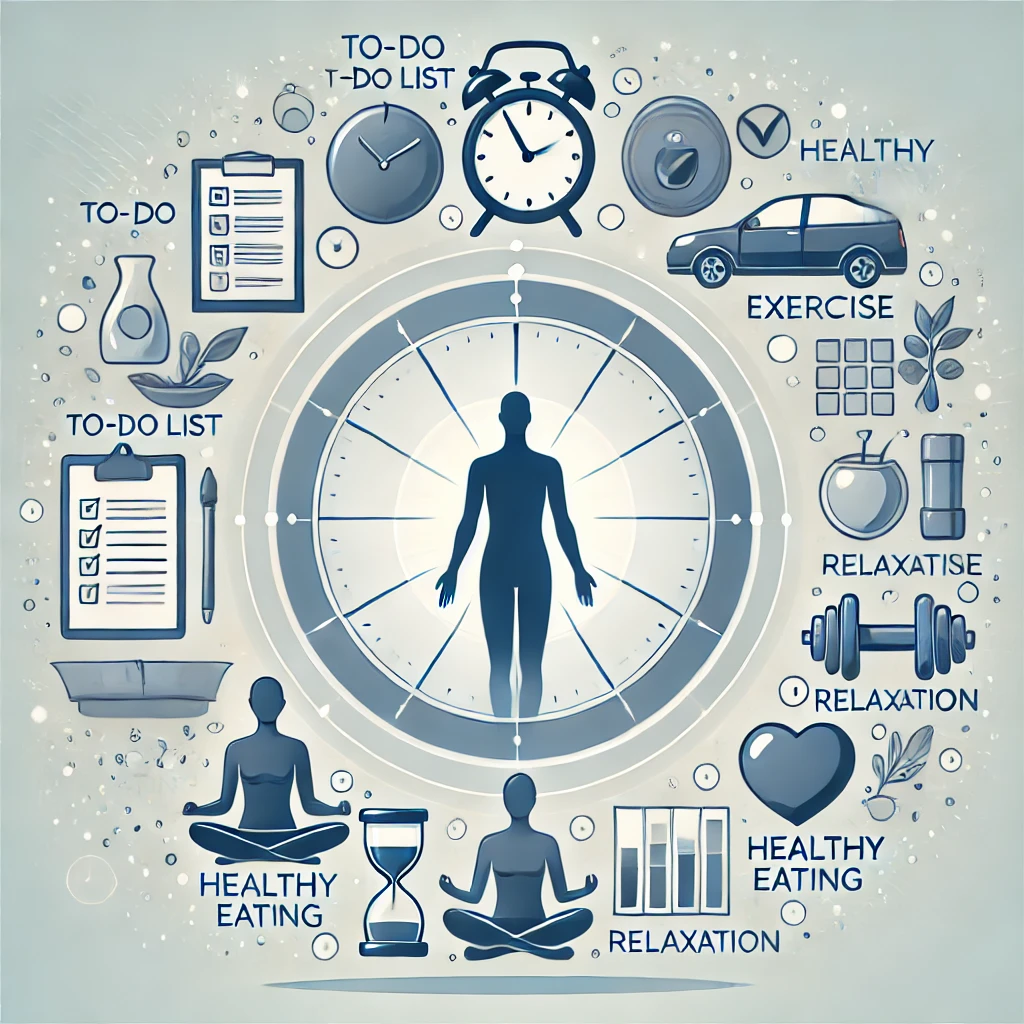
Introduction
Time organization is a key part of our daily lives. With more work and personal tasks, using time well is crucial to lower stress. The American Institute of Stress found that many people are feeling overwhelmed with work stress. So, it’s essential to know how to manage time for better productivity and happiness.

When we don’t manage our time well, it can cause a lot of problems. These can include more stress, less getting done, and not enjoying our days. The Pareto analysis shows that a lot of results come from just a few important tasks. This highlights the importance of focusing on what really matters.
The Eisenhower matrix helps us put tasks in order of urgency and importance. This makes it easier to see what to do first. Time blocking sets aside specific times for different activities. It can make you more focused and productive. Adding the Pomodoro technique can also help by breaking work into short, focused intervals.
Knowing about Parkinson’s law and Hofstadter’s law can also make a big difference. Parkinson’s law says work fills the time you give it. Hofstadter’s law shows that things often take longer than planned. To avoid these traps, follow the 70% rule. This means don’t use all your time just because it’s there. Keep some time for relaxing. This can keep your life more balanced and you more productive.
By using the right strategies daily, we can manage time better. This can lead to getting more done and feeling less stress. It helps both in our work life and at home.
Create a Prioritized To-Do List
Having a good to-do list is key for managing tasks well. It’s even more helpful when you put the most important tasks first. This approach makes work easier and lowers stress. You can make your list better by marking tasks with colors or numbers based on how important they are.
Benefits of Prioritizing Tasks
Prioritizing tasks leads to several advantages, improving how you handle your to-do list and overall work. Switching between tasks makes 43% of people tired. If you do the most important tasks first, this tiredness can drop. This method also helps teams manage their tasks more evenly. It’s easier to plan work and share it using digital to-do lists. Tasks can be updated in real time, making teamwork smoother.
How to Effectively Prioritize
The Eisenhower Matrix and the “Eat the Frog” method are great for getting more done and organizing tasks better. A to-do list app can help a lot by arranging and reminding you of your tasks. It prevents tasks from slipping your mind and works on phones and computers. Check your list every day and plan ahead to use time well. Divide big tasks into smaller parts. This makes big projects easier to handle. Starting tasks with a verb and using the Most Important Task method can focus your efforts. Teams can use agile priority setting to adjust quickly to new circumstances.
Learn to Say ‘No’
Knowing how to say ‘no’ is important for time management and stress reduction. It is closely linked to keeping a good balance between work and personal life. Many people find it hard to say ‘no’ because they worry it could make them look less dedicated or competent. But, according to the University of Waterloo, refusing tasks that go against your ethics can be tough. This shows that being firm in your decisions at work matters.
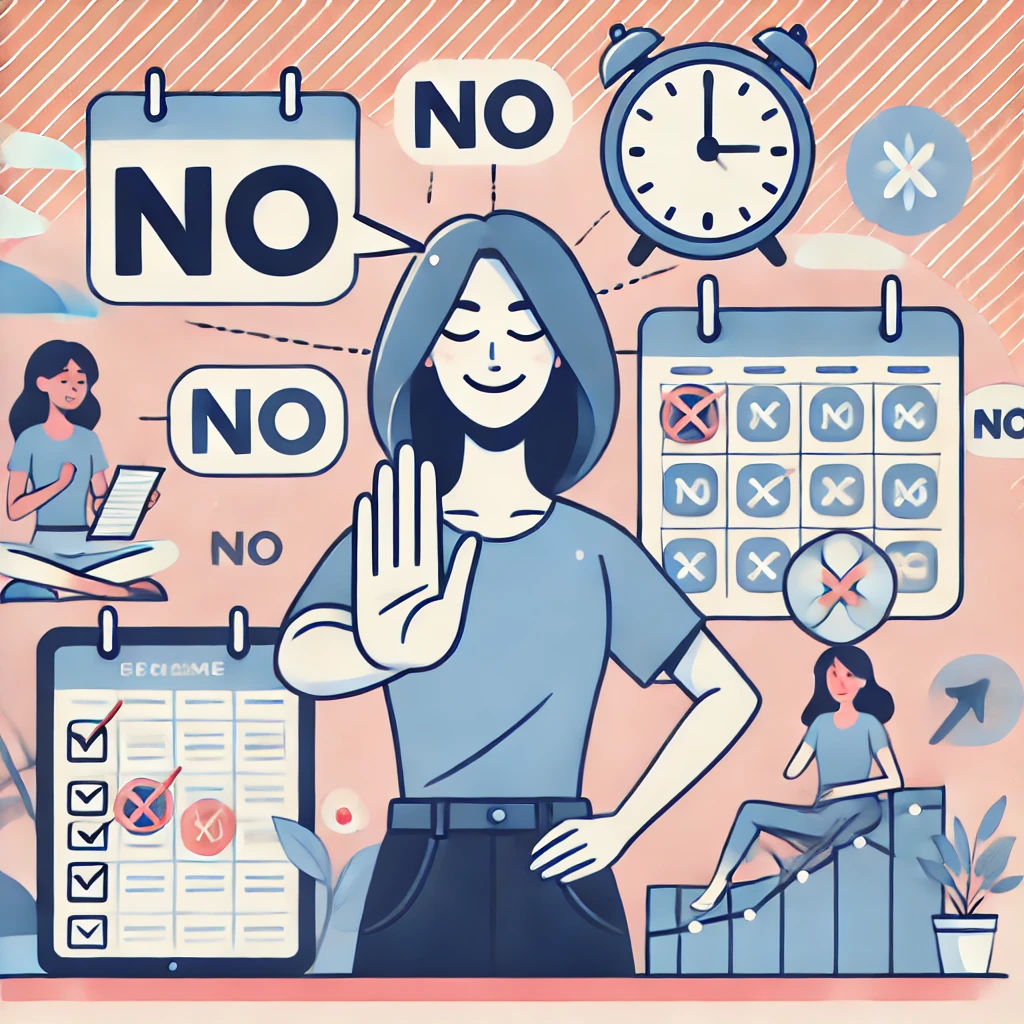
The Importance of Boundaries
Setting limits is key to avoid getting overwhelmed and handle work better. A big number, around 85%, feel stressed when they have too much work and not enough time. Saying ‘no’ to tasks that don’t help meet your goals can relieve this stress. Also, managing time well by setting time goals on tasks can boost your productivity. This way, your work doesn’t drag on forever and piles up.
Taking regular breaks is crucial. Studies prove that skipping breaks can lead to exhaustion and even more stress. The Pomodoro Technique is great for this. It divides work into smaller parts with breaks in between. Setting limits helps you focus on work that matters most. This follows the 80/20 rule, where 80% of the results come from 20% of your efforts.
Practicing Assertive Communication
Being assertive in how you talk is vital. It helps you clearly state your limits without feeling bad. It’s important to be straightforward but polite. Doing things like automating daily tasks and keeping work organized can really help with time management. However, a big 75% find saying ‘no’ to more work hard, affecting how they manage their time.
Talking clearly about how much work you can handle can make your job easier and more enjoyable. For example, saying no lets you focus more on what truly matters. These actions are key for a better balance between work and personal life, as well as for growing professionally.
When turning down tasks, it’s good to be grateful for the offer. This can make your refusal kinder and show you still care about the job and the person asking. It helps keep a positive work environment while sticking to what you need to do. With practice, you can get better at managing your time and boosting satisfaction in your work and life.
An effective way to learn to say ‘no’ is to find out how to do it well. Over time, getting good at this can help you pick work that really matches your career goals. This ensures you have a work-life balance that is both rewarding and successful.
Organize a Realistic Schedule
Having a realistic schedule is key for a good work-life balance and health. It’s important to set aside time that matches what you can actually do. This way, people can avoid being overwhelmed and feeling too stressed out.
If you’re a morning person, do the hard stuff early in the day. For those who come alive at night, save the tough tasks for then. This is when they’re most on top of things.
To plan well, divide your day into small parts. Mornings can be busy with getting ready and fixing meals. Afternoons are better for easy jobs like checking emails and shopping.
In the evening, get ready for tomorrow. Lay out your clothes and tidy up your space. This makes the next day smoother.
Visual aids like color-coded calendars help a lot. They show what needs to be done and when. For example, a morning plan with times for each step makes things go smoothly.
Saving time for the unexpected is smart. Life doesn’t always go as planned. Being open to change in your schedule can prevent big problems.
It’s good to stick to a routine for a month and see how it goes. Trying this can make you better at managing your time. Knowing how you spend your day can make you more productive and less stressed. Using tools to manage your projects can also be a great help. It lets you see your schedule clearly and keeps everything in order. This can make life and work balance better.
Combine Tasks for Efficiency
Doing several tasks together can really make things work better. By combining activities like preparing meals or grouping errands, you can achieve more in less time. This leaves you with extra time to enjoy leisure activities. When you plan errands or meals smartly, it can also help clear your mind by lessening daily decisions.

Meal Prep Strategies
Planning and preparing meals ahead of time is a great way to save time and stress. Spend a few hours a week making meals, and you’ll see a big difference. For instance, cooking several meals at once cuts down your daily cooking time. This method boosts your efficiency and leaves more time for other things.
Studies from the University of California Irvine show that interruptions can make us more stressed and frustrated. Making meals ahead of time reduces the number of decisions you make each day. This lightens your mental load and makes you feel better. It also fits well with when our minds work best, so we can focus more when we need to work.
Errand Planning
Planning errands cleverly is a big time-saver. By grouping errands that are close together, you cut down on travel time. For instance, doing all your errands in one go saves more time than separate trips.
Adding task batching to your errand planning can make a huge difference in how you use time. Studies show that even small breaks between tasks can reduce our efficiency by 40%. Smart errand planning helps create big blocks of time without interruptions. You can also let your team know about these focused hours by using tools like blocking out time on your calendar.
In the end, combining tasks through meal prep and errand planning brings many benefits. It boosts efficiency and cuts down on stress. This leaves more room for activities you enjoy and that are important to you.
Plan Ahead
Planning for the long term and setting clear goals can lower your stress. It gives you a map for the future. When you make a plan, you can see your goals and step towards them calmly. This way, you can be more productive and worry less.
Setting Long-term Goals
Looking ahead and setting long-term goals is key. Most successful people believe in drawing up goals. It helps you to see the big picture. By setting clear goals, you make tasks feel less hard. Studies show that organizations with solid project management, including good goal setting, do better.
Action Planning Techniques
To reach long-term goals, use different planning tricks. Splitting big tasks into smaller pieces can make you more likely to succeed. About half of people find block scheduling really helps with time management. Plus, putting fake deadlines can also sharpen your planning. A methodical approach that includes 20-30 minutes of weekly work planning can make you more productive and feel less stressed.
Eliminate Time-Wasting Activities
Getting rid of time-wasting stuff is key for getting more done and cutting stress. When we stop doing things that waste time, we have more time for important work.
Identify Time-Wasters
Time bandits like extra meetings, too many emails, and putting things off can hurt how much we get done. Studies show we spend half our work hours on things not really helping. Finding these distractors is the first step to working better and boosting how much we accomplish.
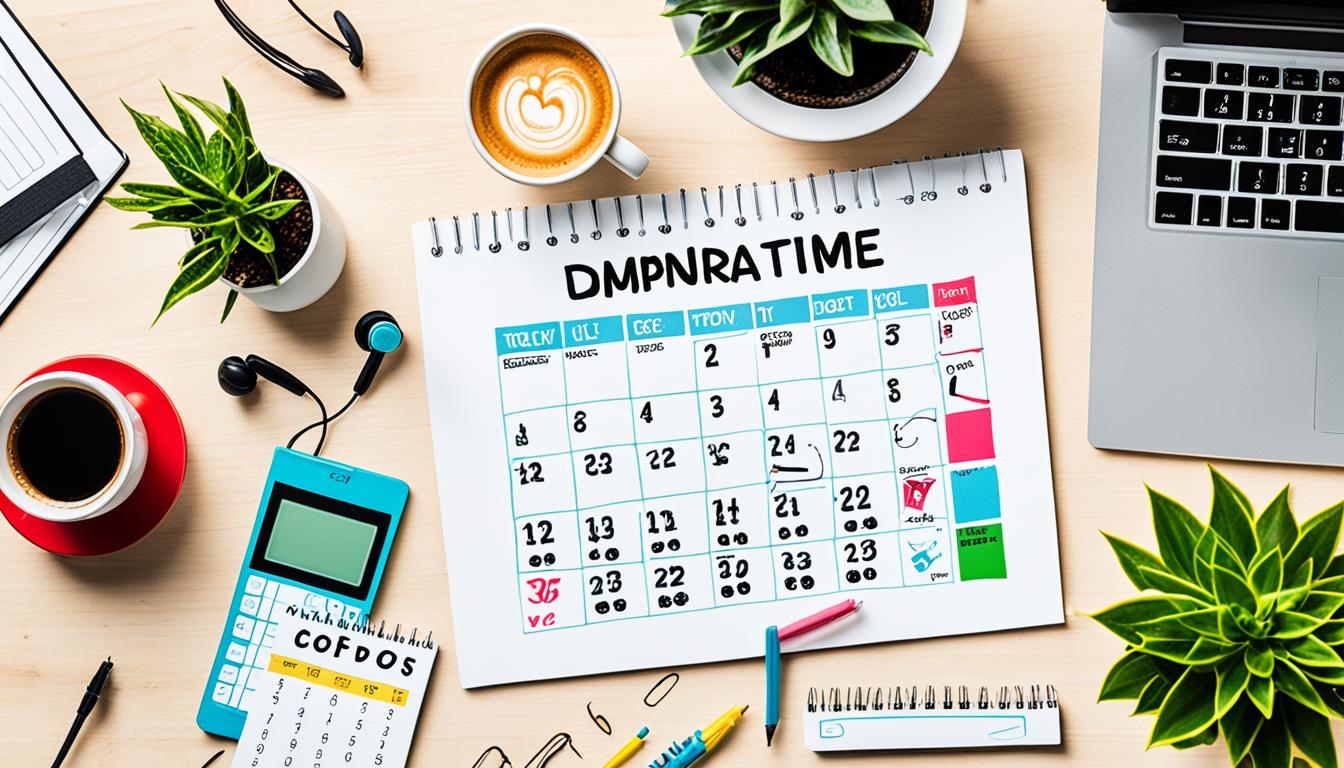
Implementing Productive Habits
After we find what’s wasting our time, we need to do better things with our time. Ways to build good habits include picking what’s most important and sticking to deadlines. CEOs doing this see better results.
Also, learning to say no and sharing work can help avoid doing too much. Using apps like Trello or Asana on your phone or computer is great for keeping track of tasks. This helps stay on time and make more space for important work.
Incorporate Time Organization in Daily Routine
Adding time management to your daily life is key. It helps make handling time well part of your routine. This means less stress and feeling better every day.
A good daily plan makes tasks clear. People like Warren Buffett and Bill Gates say having morning and night routines helps a lot. It joins what you do with what you care about, which makes life smooth.
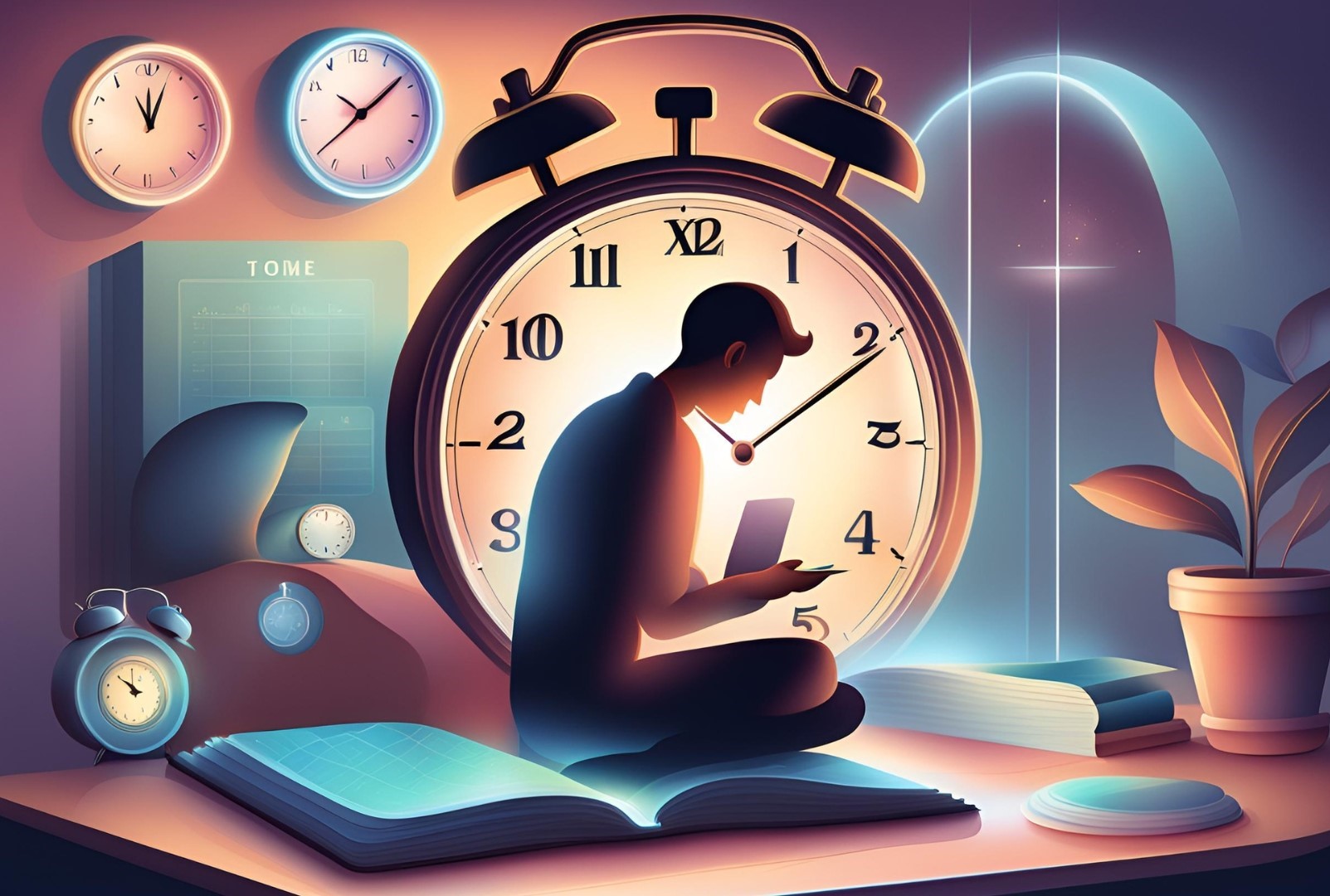
A set routine is great for money too. Those who work freely, like entrepreneurs, see the benefits. They can be more creative and on top of things with a solid routine.
Using tools like apps and planners can make your day smoother. They track your progress and keep you on time. This helps you feel less stressed and more in control.
Doing big tasks early makes your day or week better. It allows for more flexibility later on. Studies show doing one thing at a time makes you do better work. And setting times for things can help your mind stay clear and focused.
People like different levels of plan in their daily life. The National Sleep Foundation says 7-9 hours sleep is a must for a good life. Planning around what’s most important helps everyone live well.
Keep a Time Log
Keeping a time log lets you see how you spend your time. You can find patterns in your day. This helps see when you work best and when you waste time. With this data, you can figure out how to use your time better.
Tracking Your Time Effectively
Start by tracking every activity each day. Use tools like Clockify, which people love for being easy to use. It got a high rating because of its simple design. Plus, Clockify always improves, showing they care about helping you be productive.
Recording time accurately spots places you can improve. This way, your time is used wisely.
Analyzing Time Use for Improvement
After keeping your log, it’s time to look at the data. This helps find ways to do things better. For example, companies can save a lot of money each year by tracking and using time well. Analyzing your time can lead to better task assignments and project management. This all leads to better team and personal work.
Include Exercise and Relaxation in Your Schedule
Adding exercise and relaxation to your daily life helps a lot with stress. It also makes you feel better overall. Doing things like walking, dancing, or yoga can boost your confidence. They can also help with mood and lessen mild depression and anxiety.
Adults should do at least 150 minutes of moderate exercise weekly. Or they can do 75 minutes of intense exercise. This should include two days of strength training per week. Pick exercises you like, such as swimming or climbing stairs. This will keep you coming back for more, making it enjoyable and sustainable.
Don’t forget about relaxation. Techniques like deep breathing and meditation can lower your stress. They improve your life without costing much, if anything, making them easy for everyone to do.
Setting SMART goals can help you keep at it. These goals should be specific, measurable, achievable, relevant, and time-limited. You can also exercise with a friend or family. Adding variety like interval training can keep things interesting. This can boost your motivation too.
Even short bouts of exercise during the day are beneficial. Balancing a mix of exercise and relaxation is key. It will help you manage stress better. This will lead to a healthier life.
Manage Sleep and Healthy Habits
Getting enough sleep and being healthy help lower stress. Quality sleep is good for your brain and how you feel. Eating well can make you mentally stronger against stress. A good sleep routine and eating the right foods are key.
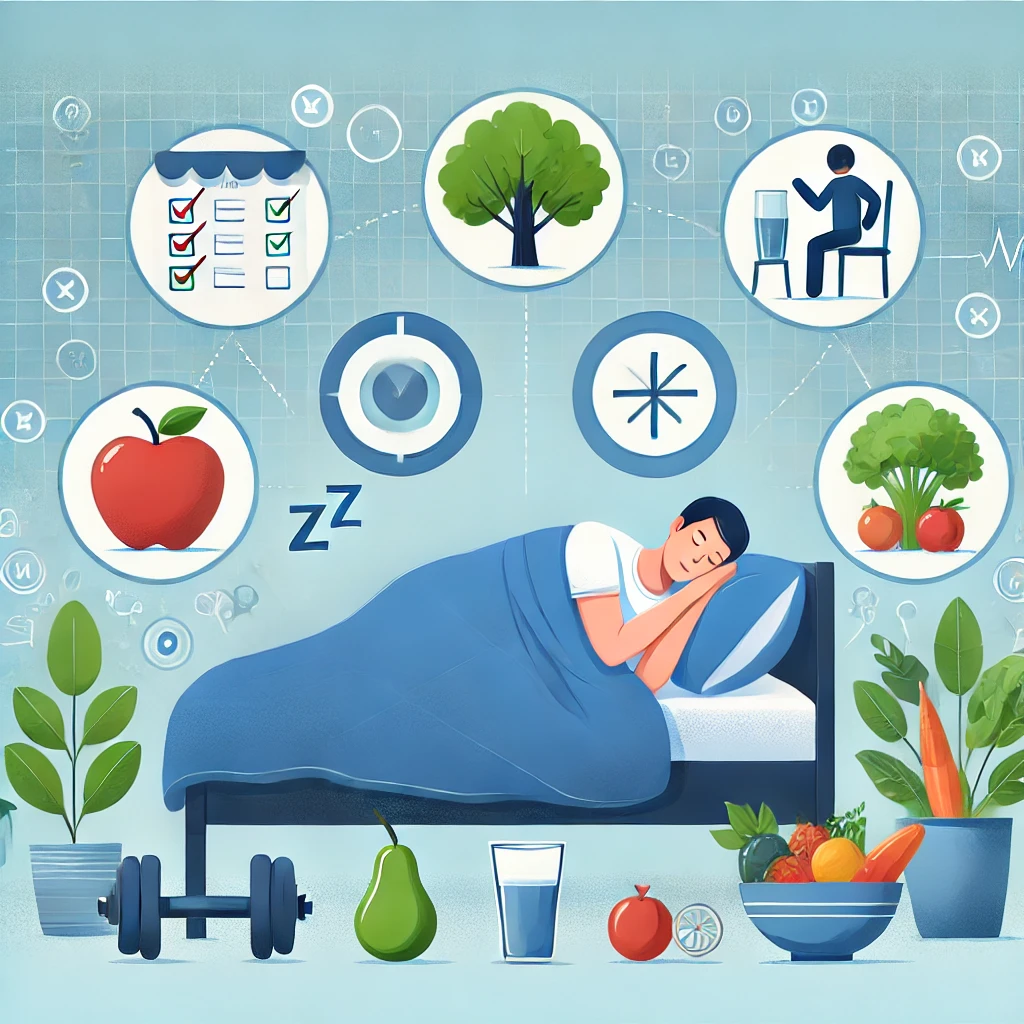
Importance of Sleep
Adults should sleep at least seven hours for their health. How well you sleep affects how well you think and your mood. Outside factors like jet lag or late-night lights can mess up your sleep. Your mood can also affect your sleep, so keeping a regular schedule is important.
Setting a Sleep Routine
Waking and sleeping at the same times every day is good for sleep. Try to wake up when it’s sunny and sleep when it’s dark. Stay away from caffeine and energy drinks late in the day. Put away screens and avoid bright lights before bed. Staying active during the day can also help you sleep better.
Nutritional Tips for Stress Reduction
Eating well can be a big help in managing stress. A diet full of fruits, veggies, lean meats, and whole grains is best. Too much caffeine and alcohol can disrupt your sleep, so watch out. Foods with lots of antioxidants, such as berries and nuts, can aid in stress reduction and better sleep too.
Use Technology to Stay Organized
Technology helps us stay organized and manage time better. Apps for time management and digital calendars are key. They make tracking tasks and deadlines simple and help avoid stress from disorganization.
Top Apps for Time Management
There are many time management apps to help us be more productive. For example, the Teuxdeux app costs between $2-3 a month. It’s easy to use and keeps you on track.
Asana is great for teams, with free options for individuals. You can also use Asana to work on projects together. For those needing to track time closely, Toggl starts at only $8 a month. With so many apps, there’s something for everyone.
Using Digital Calendars
Digital calendars are must-have tools for organization. Google Calendar, which is free, is very helpful. It reminds you of events and synchronizes smoothly on different devices so you never forget an appointment.
Syncing your calendar can change how you manage your time. With Google Calendar, you can plan your days better. This makes you more efficient and productive.
Even Dropbox helps with organization, offering 2GB free storage. It works great with calendars for scheduling. This makes sharing files and managing time easier all at once.
Conclusion
Becoming a master of time means you’ll get more done and feel less stressed. Use the tips we talked about to balance your work and personal life. You’ll have more time for yourself and a happier mind. Practicing these strategies every day can bring big changes in your work and life, making you successful and content.
Studies often show that managing time well can lower your stress. People who use smart time tricks have less stress than those who don’t. This can greatly boost how you feel inside, showing that keeping things organized is key to feeling good.
Experts always say that learning to manage time matters in every job. Their advice for cutting stress by organizing time is widespread. By turning these time skills into habits, you can be more productive, enjoy life more, and worry less. It’s the perfect recipe for a satisfying life.
FAQ
What are the key benefits of stress management through time organization?
Managing time well makes us more productive and less stressed. This leads to a healthier mind and body. It also helps balance work and life better.
How can creating a prioritized to-do list help in task management?
By prioritizing tasks, we work on the most important ones first. This cuts down on stress and helps meet deadlines. You can use colors or numbers to show which tasks are most important.
Why is learning to say ‘no’ important for effective time management?
Saying ‘no’ stops us from taking on too much and helps us focus. It keeps us from getting overwhelmed. And it makes our work more manageable.
What are some strategies for organizing a realistic schedule?
Scheduling work and personal activities helps lower stress. It’s important to plan and set tasks you can actually do. This is key for a successful schedule.
How can combining tasks improve efficiency?
Doing two things at once, like cooking while listening to a podcast, saves time. This gives you more time for yourself and reduces tiredness from making too many decisions.
What is the importance of planning ahead in time management?
Planning long-term and setting clear goals helps map out your time. It avoids sudden stress. And it leaves room for unexpected things, making tasks not as hard.
How can one identify and eliminate time-wasting activities?
Looking at how we spend time helps see what’s not useful. Then, replacing these with helpful habits boosts how we manage time. It’s also good to take smart breaks and recharge our energy.
How can incorporating time organization into a daily routine reduce stress?
Using time management daily turns it into a natural part of our life. This helps lower stress in the long run. It makes our life feel more organized.
Why is keeping a time log important?
Keeping track of our time shows when we’re most productive. It helps spot areas for improvement. This allows for better planning of our day.
How does including exercise and relaxation in a schedule help with stress management?
Exercise and relaxing are great for lowering stress. They keep our body and mind healthy. Putting them in our schedule makes sure we do them.
What role do sleep and healthy habits play in stress reduction?
Good sleep and eating well are important for our brain and mood. Having a set sleep time and eating stress-lowering foods help manage stress better.
How can technology aid in time management?
Apps and digital calendars help keep track of our tasks. They make staying organized easier. The right tech tools can help us work better and be less stressed.

More Posts
9 Tips to Improve Decision-Making Skills
Psychology Today shares that the average adult makes 35,000 decisions daily, almost feeling like countless decisions. Some are simple, like what to wear—an almost easy decision. Others are key, affecting our lives. Good...
11 Benefits of Stopping Procrastinating in Your Daily Life
Feeling stuck or under pressure to do more can push you to beat procrastination. For eight years, I've worked hard to beat it. I've written over 500 blog posts, seven books, and made...
How to Handle Repetitive Tasks - 8 Tips
Research shows a lot of us spend 20% of our work week on boring tasks. This can hurt our productivity, morale, and stress levels. It’s important to manage tasks well to be efficient...
Tips On How to Develop Good Habits That Work
When we talk about habits, one thing is quite clear that not all habits are good and vice versa. But those bad habits can significantly impact our lives negatively. On the other hand,...